Related Research Articles
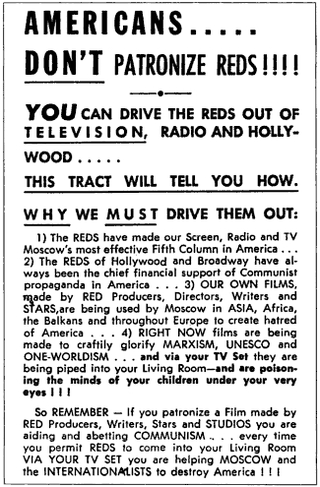
McCarthyism, also known as the Second Red Scare, was the political repression and persecution of left-wing individuals and a campaign spreading fear of alleged communist and Soviet influence on American institutions and of Soviet espionage in the United States during the late 1940s through the 1950s. After the mid-1950s, U.S. Senator Joseph McCarthy, who had spearheaded the campaign, gradually lost his public popularity and credibility after several of his accusations were found to be false. The U.S. Supreme Court under Chief Justice Earl Warren made a series of rulings on civil and political rights that overturned several key laws and legislative directives, and helped bring an end to the Second Red Scare. Historians have suggested since the 1980s that as McCarthy's involvement was less central than that of others, a different and more accurate term should be used instead that more accurately conveys the breadth of the phenomenon, and that the term McCarthyism is, in the modern day, outdated. Ellen Schrecker has suggested that Hooverism, after FBI Head J. Edgar Hoover, is more appropriate.

Rose Hobart was an American actress and a Screen Actors Guild official.
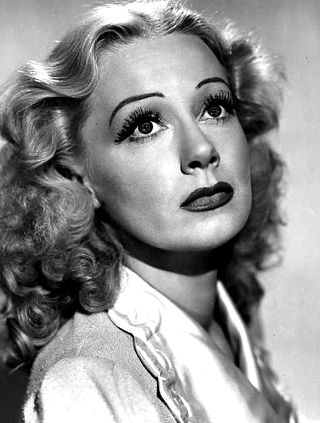
June Havoc was an American actress, dancer, stage director and memoirist.

Gypsy Rose Lee was an American burlesque entertainer, stripper, actress, author, playwright and vedette famous for her striptease act. Her 1957 memoir was adapted into the 1959 stage musical Gypsy.

Judy Holliday was an American actress, comedian and singer.
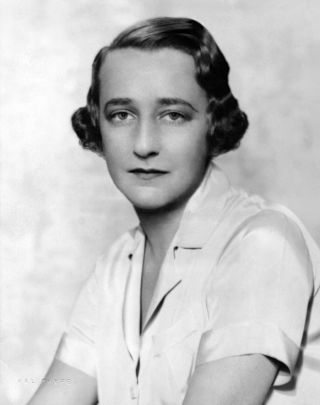
Lillian Florence Hellman was an American playwright, prose writer, memoirist and screenwriter known for her success on Broadway, as well as her communist sympathies and political activism. She was blacklisted after her appearance before the House Committee on Un-American Activities (HUAC) at the height of the anti-communist campaigns of 1947–1952. Although she continued to work on Broadway in the 1950s, her blacklisting by the American film industry caused a drop in her income. Many praised Hellman for refusing to answer questions by HUAC, but others believed, despite her denial, that she had belonged to the Communist Party.

Lena Mary Calhoun Horne was an American singer, actress, dancer, and civil rights activist. Horne's career spanned more than seventy years, appearing in film, television, and theatre. Horne joined the chorus of the Cotton Club at the age of sixteen and became a nightclub performer before moving on to Hollywood and Broadway.
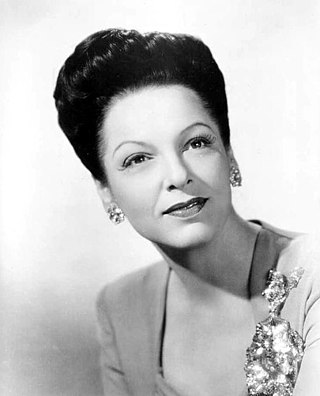
Gale Sondergaard was an American actress.

Jerome Robbins was an American dancer, choreographer, film director, theatre director and producer who worked in classical ballet, on stage, film, and television.

Marguerita Maria Christians, known as Mady Christians, was an Austrian-born German-American actress who had a successful acting career in theatre and film in the United States until she was blacklisted during the McCarthy period.

Anne Revere was an American actress and a liberal member of the board of the Screen Actors' Guild. She was best known for her work on Broadway and her portrayals of mothers in a series of critically acclaimed films. An outspoken critic of the House Un-American Activities Committee, her name appeared in Red Channels: The Report on Communist Influence in Radio and Television in 1950 and she was subsequently blacklisted.

Red Channels: The Report of Communist Influence in Radio and Television was an anti-Communist document published in the United States at the start of the 1950s. Issued by the right-wing journal Counterattack on June 22, 1950, the pamphlet-style book names 151 actors, writers, musicians, broadcast journalists, and others in the context of purported Communist manipulation of the entertainment industry. Some of the 151 were already being denied employment because of their political beliefs, history, or association with suspected subversives. Red Channels effectively placed the rest on a blacklist.
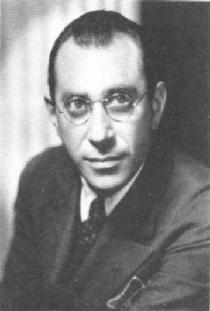
Herbert J. Biberman was an American screenwriter and film director. He was one of the Hollywood Ten and directed Salt of the Earth (1954), a film barely released in the United States, about a zinc miners' strike in Grant County, New Mexico. His membership in the Directors Guild of America was posthumously restored in 1997; he had been expelled in 1950.

The Committee for the First Amendment was an action group formed in September 1947 by actors in support of the Hollywood Ten during the hearings of the House Un-American Activities Committee (HUAC). It was founded by screenwriter Philip Dunne, actress Myrna Loy, and film directors John Huston and William Wyler.
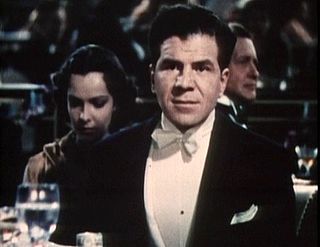
Lionel Jay Stander was an American actor, activist, and a founding member of the Screen Actors Guild. He had an extensive career in theatre, film, radio, and television that spanned nearly 70 years, from 1928 until 1994. He was known for his distinctive raspy voice and tough-guy demeanor, as well as for his vocal left-wing political stances. One of the first Hollywood actors to be subpoenaed before the House Un-American Activities Committee, he was blacklisted from the late 1940s until the mid-1960s.

Margo was a Mexican actress and dancer. She appeared in many film, stage, and television productions, including Lost Horizon (1937), The Leopard Man (1943), Viva Zapata! (1952), and I'll Cry Tomorrow (1955). She married actor Eddie Albert in 1945 and was later known as Margo Albert.
Phoebe Brand was an American actress.
Madeline Lee Gilford was an American film and stage actress and social activist, who later enjoyed a career as a theatrical producer. Gilford was married, secondly, to actor Jack Gilford from 1949 until his death in 1990.
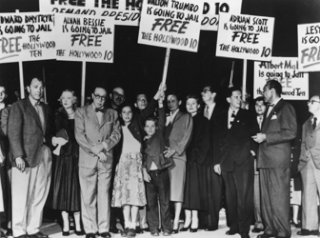
The Hollywood blacklist was an entertainment industry blacklist put in effect in the mid-20th century in the United States during the early years of the Cold War, in Hollywood and elsewhere. Actors, screenwriters, directors, musicians, and other American entertainment professionals were barred from work by the studios.
Martin Berkeley was a Hollywood and television screenwriter who cooperated with the House Un-American Activities Committee (HUAC) in the 1950s by naming dozens of Hollywood artists as Communists or Communist sympathizers.
References
- ↑ Red Channels: The Report of Communist Influence in Radio and Television. New York, NY: Counterattack. 1950.
- ↑ Stabile, Carol (2018). The Broadcast 41: Women and the Anti-Communist Blacklist. London: Goldsmiths Press. ISBN 978-1-906897-87-1.
- ↑ Caspary, Vera (1968). The Rosecrest Cell. London: W.H. Allen.
- ↑ Barranger, Millie (2008). Unfriendly Witnesses: Gender, Theater, and Film in the McCarthy Era. Southern Illinois University Press.
- ↑ Horne, Gerald (2015). Race Woman: The Lives of Shirley Graham Du Bois. New York University Press.
- ↑ Gussow, Mel (2004). "Uta Hagen, Tony-Winning Broadway Star and Teacher of Actors, Dies at 84". The New York Times. ISSN 0362-4331 . Retrieved 2018-03-10.
- ↑ Alice., Kessler-Harris (2012). A difficult woman : the challenging life and times of Lillian Hellman. New York: Bloomsbury Press. ISBN 9781608193950. OCLC 738346448.
- ↑ Hobart, Rose (1994). A Steady Digression to a Fixed Point. Scarecrow Press.
- ↑ Gary., Carey (1982). Judy Holliday, an intimate life story (1st ed.). New York: Seaview Books. ISBN 0872237575. OCLC 8194852.
- ↑ Horne, Lena (1965). Lena. New York, NY: Doubleday.
- ↑ "Marsha Hunt at 100: The Actress Recalls the Blacklist, Film Noir and Being Cast in Gone With The Wind - MovieMaker Magazine". MovieMaker Magazine. 2017-10-13. Retrieved 2018-03-10.
- ↑ Frankel, Noralee (2010). Stripping gypsy : the life of Gypsy Rose Lee. New York: Oxford University Press. ISBN 9780199754335. OCLC 658003848.
- ↑ Lee, Madeline (August 22, 1955). "Madeline Lee's Statement to the Witchhunters". The Daily Worker .
- ↑ Muir, Jean. Autobiography. University of Oregon Special Collections and University Archives: unpublished.
- ↑ Meade, Marion (1989). Dorothy Parker : what fresh hell is this?. New York: Penguin. ISBN 9780140116168. OCLC 18351200.
- ↑ Karen., Chilton (2008). Hazel Scott : the pioneering journey of a jazz pianist from Café Society to Hollywood to HUAC . Ann Arbor: University of Michigan Press. ISBN 9780472115679. OCLC 179794223.
- ↑ Spaulding, Stacy (2005-12-05). LISA SERGIO: HOW MUSSOLINI'S "GOLDEN VOICE" OF PROPAGANDA CREATED AN AMERICAN MASS COMMUNICATION CAREER (Ph.D. thesis). Retrieved January 29, 2024.
- ↑ Barranger, Milly (2004). Margaret Webster: A Life in the Theater. University of Michigan.